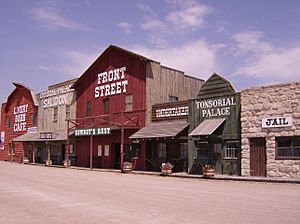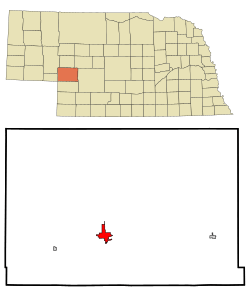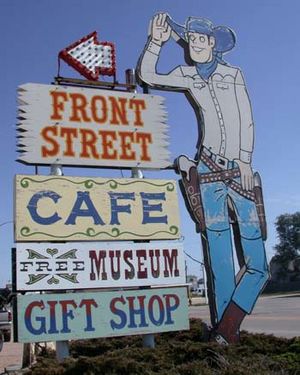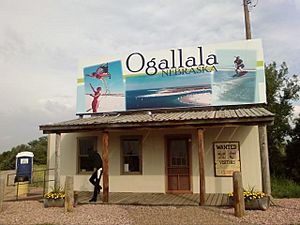Ogallala, Nebraska facts for kids
Quick facts for kids
Ogallala, Nebraska
|
|
|---|---|

Front Street tourist attraction
|
|

Location of Ogallala, Nebraska
|
|
| Country | United States |
| State | Nebraska |
| County | Keith |
| Founded | 1868 |
| Government | |
| • Type | City Council/City Manager |
| Area | |
| • Total | 5.02 sq mi (13.00 km2) |
| • Land | 4.96 sq mi (12.84 km2) |
| • Water | 0.06 sq mi (0.16 km2) |
| Elevation | 3,232 ft (985 m) |
| Population
(2020)
|
|
| • Total | 4,878 |
| • Density | 984.06/sq mi (379.96/km2) |
| Time zone | UTC-7 (Mountain (MST)) |
| • Summer (DST) | UTC-6 (MDT) |
| ZIP code |
69153
|
| Area code(s) | 308 |
| FIPS code | 31-35980 |
| GNIS feature ID | 2395305 |
| Website | ogallala-ne.gov |
Ogallala is a city in Nebraska, United States. It is the main city in Keith County, Nebraska. In 2020, about 4,878 people lived there.
Long ago, when Nebraska was still a territory, Ogallala was an important stop. It was a station for the Pony Express, which delivered mail quickly across the country. Later, it became a stop on the first transcontinental railroad. A huge underground water source, called the Ogallala Aquifer, is named after the city.
Contents
History of Ogallala
Ogallala started as a place where cattle drives ended. Cowboys would bring cattle all the way from Texas to Ogallala. From here, the cattle were loaded onto Union Pacific trains. These trails were known as the Western or Great Western trails.
The Union Pacific Railroad reached Ogallala on May 24, 1867. The city itself was officially planned in 1875. It became an official city in 1884. The name "Ogallala" comes from the Oglala Sioux tribe.
Geography and Climate
Ogallala is located in the United States. It covers about 5 square miles (13 square kilometers). Most of this area is land, with a small part being water. The city is in the Mountain Time Zone.
Ogallala is very close to Lake McConaughy. This is a large lake made by people. It's a popular spot for fun activities like boating, swimming, and relaxing on sandy beaches. The South Platte River also flows through Ogallala.
Climate in Ogallala
Ogallala has a climate that can be described as dry and warm. It gets about 20 inches (518 mm) of rain each year. Winters are cold, and summers are hot. Summers can also have storms. Most of the rain falls in the late spring and summer. Winter is the driest time of year.
Population and People
| Historical population | |||
|---|---|---|---|
| Census | Pop. | %± | |
| 1880 | 114 | — | |
| 1890 | 494 | 333.3% | |
| 1900 | 355 | −28.1% | |
| 1910 | 643 | 81.1% | |
| 1920 | 1,062 | 65.2% | |
| 1930 | 1,631 | 53.6% | |
| 1940 | 3,159 | 93.7% | |
| 1950 | 3,456 | 9.4% | |
| 1960 | 4,250 | 23.0% | |
| 1970 | 4,976 | 17.1% | |
| 1980 | 5,638 | 13.3% | |
| 1990 | 5,095 | −9.6% | |
| 2000 | 4,930 | −3.2% | |
| 2010 | 4,737 | −3.9% | |
| 2020 | 4,878 | 3.0% | |
| U.S. Decennial Census 2012 Estimate |
|||
In 2020, there were 4,878 people living in Ogallala. There were about 2,300 households. The population density was about 983 people per square mile.
Most people in Ogallala are white. A smaller number of people are from other racial backgrounds. About 9% of the population is Hispanic or Latino.
The average age of people in Ogallala in 2020 was 43.5 years old. About 19.6% of the people were under 18 years old. About 21.5% were 65 years or older.
Arts and Culture
Points of Interest
The Ogallala post office has a special painting inside. It's an oil painting called Long Horns. It was painted in 1938 by an artist named Frank Mechau. Many murals like this were created across the United States during that time. They were part of a government project to support art.
Education in Ogallala


Ogallala has both public and private schools for students.
Public Schools
The Ogallala Public School District serves the city.
- High School: Ogallala High School
- Elementary and Middle School: Prairie View School (for grades from Pre-Kindergarten to 8th grade)
Private Schools
- St. Paul's Lutheran School (Pre-Kindergarten to 5th grade)
- St. Luke's Catholic School (Pre-Kindergarten to 5th grade)
Media
Ogallala has local radio stations and a newspaper.
Radio Stations
- KOGA (AM) (930 AM): Plays adult standards music.
- KOGA-FM (99.7 FM): Plays classic rock music.
- KMCX (106.5 FM): Plays hot country music.
Newspaper
- Keith County News: This newspaper comes out every two weeks.
Transportation
You can travel to and from Ogallala by bus. Bus services like Burlington Trailways and Express Arrow serve the city. Inside Ogallala, there is a special bus service called Ogallala Public Transit. It offers "dial-a-ride" service, meaning you can call to arrange a ride.
Notable People from Ogallala
Some well-known people have come from Ogallala:
- John Lanigan: A famous morning radio host. He is in the National Radio Hall of Fame.
- Ken Schilz: He served as a state senator for Nebraska.
- Thomas Shanahan: He was a United States federal judge.
See also
 In Spanish: Ogallala (Nebraska) para niños
In Spanish: Ogallala (Nebraska) para niños
 | Kyle Baker |
 | Joseph Yoakum |
 | Laura Wheeler Waring |
 | Henry Ossawa Tanner |

